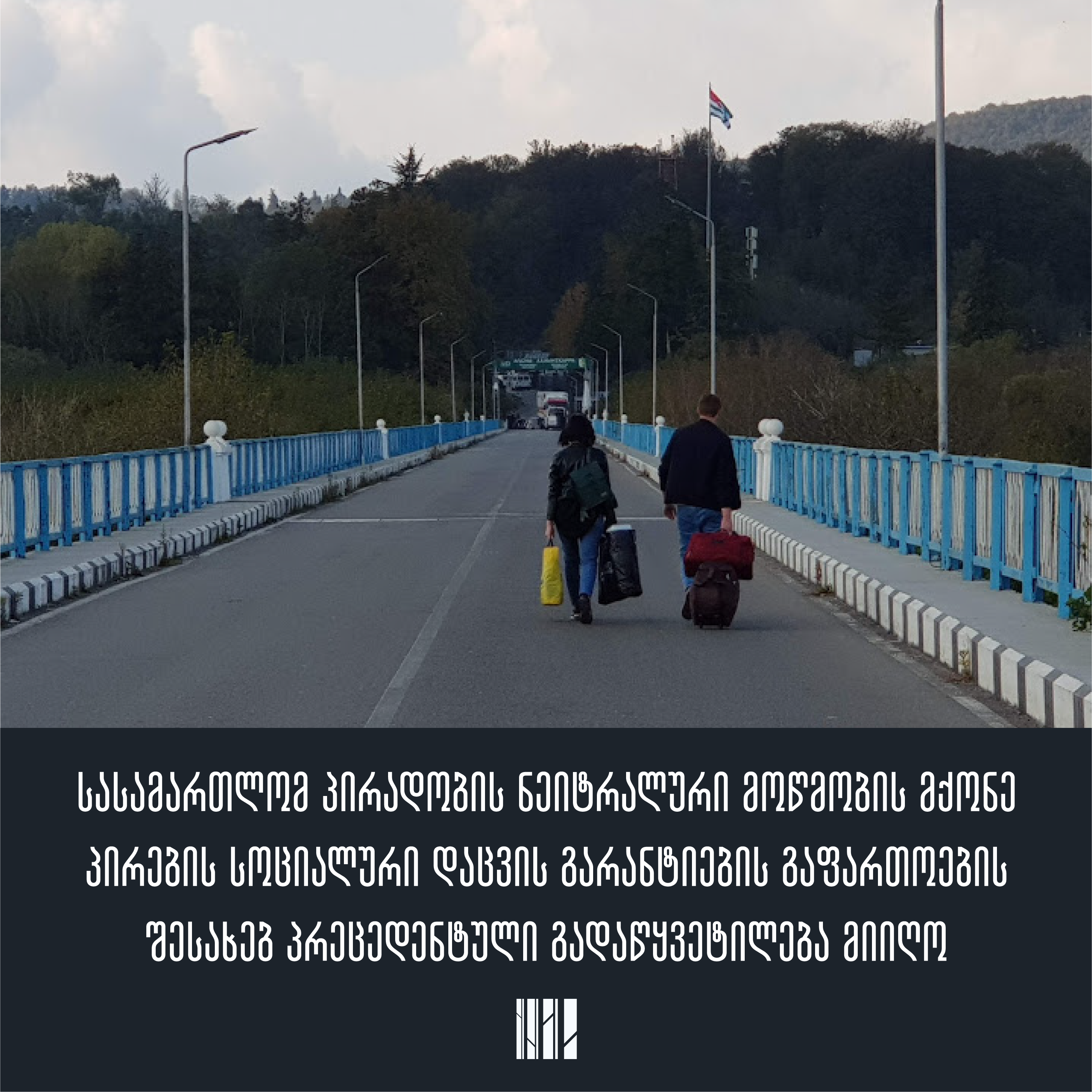საერთო ცხელი ხაზი +995 577 07 05 63


The Social Justice Center has won a landmark court case concerning disabled people in Abkhazia, compelling the government to strengthen social security guarantees for those possessing a neutral Georgian identification card and promote social equality among residents. This court judgement is a defining moment that should serve as the basis for a comprehensive examination of current policies and potential legislative reforms.
In 2021, a person with severe disabilities residing in Ochamchire (Abkhazia) who holds a neutral Georgian ID card and has not been granted citizenship of another country applied to the Georgian Social Service Agency for a pension for persons with disabilities and compensation aimed at mitigating the COVID-19 pandemic's hardships. Unfortunately, the Social Services Agency did not grant his request. The Agency stated that he was not considered a Georgian citizen since he had a neutral identification card, making him ineligible for social assistance.
The Social Justice Center appealed the Agency's decision, arguing that the human right to a minimum standard of living, which is directly linked to the right to life and self-development, social assistance, adequate housing, etc., is a positive state obligation and the guiding principle of the welfare state. It cannot be linked with a particular identification document or a legal address. Furthermore, we believe that the complete protection, integration, and assistance of the people living in the occupied regions by the Georgian government reflects the constitutional idea of territorial integrity and the country's announced de-occupation strategy. In this instance, the state failed to meet these objectives and responsibilities.
The Tbilisi City Court deemed the aforementioned Social Protection Agency ruling unconstitutional and sided with the Social Justice Center's arguments in full. Specifically, the court stressed the ideals of social justice, equality, and solidarity, as well as the need to uphold fundamental human rights in governmental actions, and stated:" An interpretation of the legislative norm which the administrative body provided the plaintiff contradicts the basic principles of the welfare state […] human rights and freedoms guaranteed by Georgia's Constitution and international treaties or agreements have direct force in the exercise of state power, which means that public institutions must be guided by the constitution and the true meaning behind it when performing the authority granted by Georgian legislation to preserve the true essence of the given right (freedom), and no unlawful interference in the field covered by this right may be made.
The court also assessed in detail the legal significance of a neutral ID card: "The legislator equated the neutral identification document with a personal identity card, endowing it with the legal significance of identifying a person granting it the capacity to participate in legal relations […] By issuing a neutral identification card, the state provided the plaintiff with a personal number and thus the ability to engage in legal relations, which includes the usage of social benefits […]. Therefore, the plaintiff is considered a Georgian citizen. As the social packages are eligible to citizens of Georgia, the plaintiff is entitled to one, regardless of the type of identification document issued in his name.
The court also emphasized the significance of de-occupation policies to the state: "It is unreasonable to deny state-provided social aid to a person possessing a neutral identification card based on the lack of an express reference in the legislation. Considering that the Georgian government approved the state policy concerning the occupied territories utilizing the engagement partnership approach, which envisions such fundamental principles as Georgia's sovereignty and territorial integrity. Georgia's internationally recognized borders are unyielding, though the Georgian government is seeking to make accessible to the residents of Abkhazia and the Tskhinvali residents all the benefits that have accrued as a consequence of the country's continuing reforms."
This ruling of the court, in our opinion, modifies the problematic attitudes and practises of the state, which provides a limited social guarantee to those with a neutral identity card, and will help boost future access to social assistance for those residing in occupied regions.
At the time, the implementation of a neutral ID card system by the Georgian government was a step forward in protecting the rights of residents of occupied regions, reducing their isolation, and expanding their mobility inside Georgia. The current legislation grants certain social benefits to persons holding neutral ID cards, including the use of state health programmes, enrollment in a general, higher and vocational education institutions, and registration as an entrepreneur and taxpayer; in addition to the right to open a bank account and receive a state grant, however, the mechanism does not extend to them such fundamental social guarantees and programmes as pensions, including pensions for people with disabilities, municipal housing, and cash benefits. In addition to producing unwarranted discrimination against people with neutral Georgian ID cards, this strategy fails to comply with the social and political purposes of acquiring such a document and fails to provide genuine protection to those living in occupied regions within the social protection system.
Notably, the number of individuals acquiring a neutral ID card is extremely low, which may be attributed to the limited social protections associated with this status. According to the LEPL State Services Development Agency, a total of 246 neutral ID cards were issued between 2016 and the end of 2021, with the majority going to residents of Sukhumi and Ochamchire.
We hope that, in light of the Tbilisi City Court's ruling, the Parliament of Georgia, the Government of Georgia within its jurisdiction, and the relevant executive agencies will provide broader social guarantees, issuance, and programmes for persons with a neutral identity card, as well as substantially enhance the protection of the rights and social needs of individuals residing in occupied territories.
The website accessibility instruction